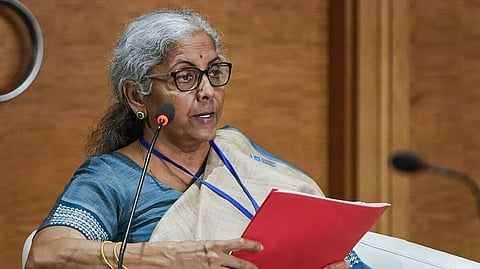

NEW DELHI: In the final Union budget presented before the Lok Sabha elections of 2024, Finance Minister Nirmala Sitharaman had few opportunities to offer populist reforms that would be game-changers. What she chose to do instead was maintain the status quo on many variables, such as leaving divestments and capital gains alone, without ruffling too many feathers. The proceedings began with a recall that India’s economic growth was estimated to be 7% for the coming year, in spite of the global slowdown. This is said to be the highest among major economies.
Sitharaman then made an announcement on capital expenditure, for which the investment outlay has been increased by 33% YoY to Rs 10 lakh crore. The idea is to push it to 3.3% of the GDP. Also, Rs 10,000 cr is being set aside annually for urban infrastructure, while the highest ever capital outlay of Rs 2.4 lakh crore was earmarked for the Railways. Boosting infrastructure development as a means to generate growth and employment is a focus area. So, a proposal to develop urban infrastructure in Tier 2 and Tier 3 cities was made, through creation of the Urban Infrastructure Development Fund.
Fiscal management is also a high priority item as part of which a fiscal deficit of 3.5% of GSDP was allowed for States (with 0.5% tied to power sector reforms). The targeted fiscal deficit is set to be below 4.5% by 2025-26. In the midst of all these talks regarding consolidation, it looks like Sitharaman has not forgotten about the common taxpayer.
The middle-class found some reasons to cheer on the personal income tax front. Under the new tax regime, the income limit for rebate of income tax has increased from Rs 5 lakh to Rs 7 lakh. Other citizen-centric measures included extending benefits of standard deduction to the new tax regime for the salaried class and pensioners, and through slashing of rates in the new tax slabs.
Critics have said that the budget has skipped pain points like the spiralling inflation and the rising unemployment. MSMEs are now unable to avail of the necessary credit to keep their enterprises alive. To top it off, the idea of providing any relief on GST on account of business losses accrued over the pandemic years has also fallen on deaf ears.
The government believes its focus on green growth, aimed at promoting sustainable modes of transportation, renewable sources of energy (green hydrogen) and green agriculture will more than make up for the shortcomings. On the agro front, Rs 20 lakh crore of credit has been directed at the Animal Husbandry, Dairy and Fisheries sector. On the industrial front, Make AI in India is being pitched as a step in the right direction with three specialised CoEs to be set up in educational institutions. Contract execution for MSMEs will also be simplified soon, with redundant compliance requirements being relaxed. As many as 100 labs are also being set up for 5-G services based app-development.
As this is the final budget before the election year, it leaves ample room for tall promises to be made during the interim budget next year. For the common man and woman, it remains to be seen whether the aforementioned proposals, especially the ones pertaining to personal income tax, will free up more money in the citizen’s hands, which will in turn stimulate demand and drive consumption — the real engines of the economy.
Visit news.dtnext.in to explore our interactive epaper!
Download the DT Next app for more exciting features!
Click here for iOS
Click here for Android